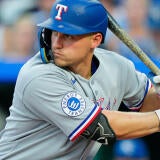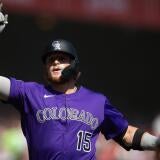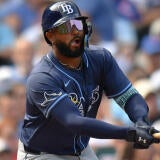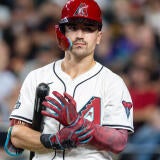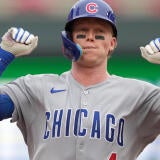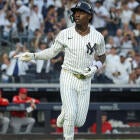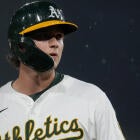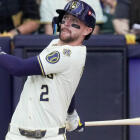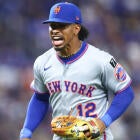Fantasy Baseball Prospects Report: Trade deadline puts a spotlight on these 15
Get to know some of the best prospects who changed hands at the deadline
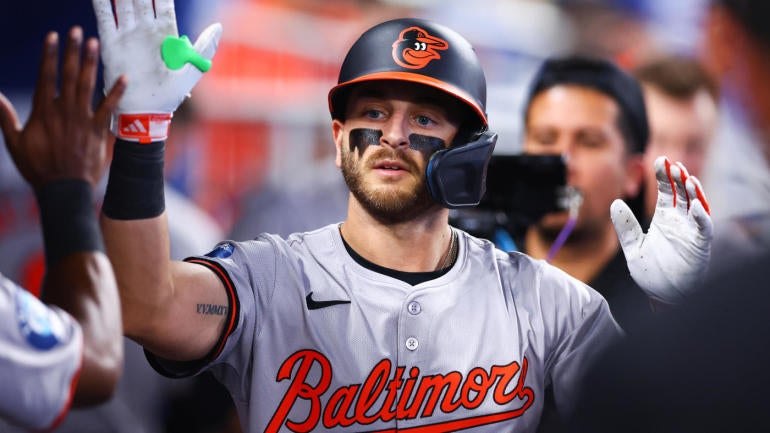
The focus at the trade deadline is rightfully on the win-now pieces going to contending clubs, but going back the other way are prospects who the non-contending clubs liked enough to target deliberately.
Often, such trades are our first introduction to those prospects, but even when the prospects are already known, the mere mention of them prompts a second look, particularly since a new organization can mean a new opportunity or a new approach.
My initial plan was to rank the prospects moved at the deadline -- the top 10-15, anyway -- but I decided that the distinctions within those rankings wouldn't be strong enough to warrant that approach. Instead, I've opted to write about ... the ones I wanted to write about, sorting them into three categories: five who've already reached the majors, five who could soon reach the majors, and five who are still far from the majors.
All stats are updated through Tuesday, July 30.
FIVE WHO'VE ALREADY REACHED THE MAJORS
(Note that some of these players have technically exhausted their prospect eligibility, but they're still trying to establish themselves in the majors.)
Connor Norby, 2B, Marlins
AAA: .297 BA (320 AB), 16 HR, 13 SB, .908 OPS, 47 BB, 104 K
Majors: .188 BA (32 AB), 2 HR, 1 2B, .594 OPS, 0 BB, 12 K
Though the outcomes were impressive in the minors, Norby's power came less from him making high-quality contact than him optimizing the shape of that contact -- the Isaac Paredes road map to success, in other words -- and that profile was never going to work at Camden Yards, with its outrageous left-field dimensions. It at least has a chance in Miami, where Norby will get many more opportunities to fail than he would have with the Orioles.
Joey Loperfido, OF, Blue Jays
AAA: .272 BA (162 AB), 13 HR, 9 SB, .933 OPS, 21 BB, 53 K
Majors: .236 BA (106 AB), 2 HR, 2 SB, .658 OPS, 7 BB, 43 K
The early-season hype has died down as Loperfido has bounced between the majors and minors, getting only sporadic at-bats with Houston, but it's still a fact that he's hit the ball much harder than a year ago, when he was nevertheless a 25-homer, 27-steal guy. There's an underappreciated ceiling here that he'll have a much better chance of reaching with Toronto, though his bloated strikeout rate remains a significant hurdle.
Kyle Stowers, OF, Marlins
AAA: .240 BA (229 AB), 18 HR, 16 2B, .877 OPS, 26 BB, 66 K
Majors: .306 BA (36 AB), 1 HR, 4 2B, .797 OPS, 0 BB, 13 K
Stowers is the sort of C-grade prospect who was never going to get more than a cursory glance with the Orioles, given their stable of young bats, but he should get a long look with the Marlins. The power is legitimate. There's just the question of if he'll get to it often enough, with his upside case looking a bit like Joc Pederson.
Jake Bloss, SP, Blue Jays
A+/AA/AAA: 1.64 ERA, 0.79 WHIP, 66 IP, 21 BB, 63 K
Majors: 6.94 ERA, 1.63 WHIP, 11 2/3 IP, 3 BB, 11 K
Bloss ranks pretty high on real-life prospect lists, with some impressive minor-league numbers to back it up, but he's a prospect who stands out more for his floor than his ceiling. He won't be a big bat-misser but should be able to limit hard contact and accumulate innings.
Jose Tena, SS, Nationals
AAA: .294 BA (374 AB), 17 HR, 14 SB, .836 OPS, 30 BB, 105 K
Majors: 0 for 4, 2 K
While he was buried in a pile of young infielders with the Guardians, Tena should get a chance to audition for the Nationals' third base job sooner than later, and while he's not an imposing presence at 5-feet-11, he had an average exit velocity of 91.5 mph and a max of 112.1 mph at Triple-A. The amount of swing-and-miss is suboptimal, but there's sneaky upside here for a player who still has time to realize it at age 23.
FIVE WHO COULD SOON REACH THE MAJORS
Agustin Ramirez, C, Marlins
AA/AAA: .271 BA (339 AB), 20 HR, 19 SB, .865 OPS, 43 BB, 67 K
The prize of the Jazz Chisholm trade is fittingly the most highly regarded prospect in this entire article, have carried last year's breakout into the upper minors with a disciplined approach, a swing that's geared for power, and even some inclination to run despite not being at all fast. It's a stretch to think he'll stick behind the plate, but the bat would play elsewhere.
Deyvison De Los Santos, 1B, Marlins
AA/AAA: .328 BA (354 AB), 30 HR, 1.025 OPS, 24 BB, 87 K
It's only been a couple games, but De Los Santos' assault of Triple-A pitching has persisted even in a more neutral environment, which is not so surprising given his superlative exit velocities. The real test will come when major-league pitchers take aim at his 44 percent chase rate, which is liable to happen sooner than later now that he's in an organization where the path is clear.
Nick Yorke, 2B, Pirates
AA/AAA: .278 BA (320 AB), 10 HR, 14 SB, .785 OPS, 42 BB, 68 K
Yorke made a big splash in his first professional season, slashing .325/.412/.928 between both levels of A-ball to emerge as a consensus top-50 prospect, but he fell on hard times in the two years thereafter. This year has been a rebound of sorts, though, particularly with his move up to Triple-A, where he's slashed .310/.408/.490 with exit velocities (91.7 mph average and 109.1 mph max) that, frankly, I didn't think he was capable of.
Charles McAdoo, 3B, Blue Jays
A+/AA: .315 BA (327 AB), 14 HR, 17 SB, .932 OPS, 40 BB, 85 K
Not drafted until the 13th round last year, McAdoo has been such a pleasant surprise that the Pirates saw fit to cash in at the trade deadline, but I think the 22-year-old has staying power. His production has dipped only a little with his recent move up to Double-A, where he continues to make good swing decisions and deliver above-average exit velocities, exhibiting a solid all-around hitting profile.
Will Wagner, 2B, Blue Jays
AAA: .307 BA (261 AB), 5 HR, .424 OBP, .853 OPS, 54 BB, 33 K
The son of longtime closer Billy Wagner is an unconventional prospect in that he rarely puts the ball in the bleachers and isn't a great fit anywhere on the diamond, but what he does well he does so well that he may just make it work. In short, he gets on base, but he also has exceptional contact skills and good enough exit velocities that he may get to more power in time. The problem is he's 26, and, well, the Blue Jays already have one Spencer Horwitz.
FIVE WHO ARE STILL FAR FROM THE MAJORS
George Klassen, SP, Angels
A-/A+: 1.97 ERA, 0.98 WHIP, 59 1/3 IP, 21 BB, 89 K
In college a year ago, Klassen couldn't throw a strike, but the Phillies drafted him in the sixth round and immediately went to work on his delivery, making him one of the biggest risers among pitching prospects this year. His fastball pushes triple digits with good carry at the top of the zone. You could almost hear the gasps from the prospect hounds on Twitter when the Angels landed Klassen in the Carlos Estevez deal.
Robby Snelling, SP, Marlins
AA: 6.01 ERA, 1.68 WHIP, 73 1/3 IP, 33 BB, 67 K
Many publications regarded Snelling as the top left-handed pitching prospect coming into the season, having put together a 1.82 ERA with 10.2 K/9 last year, but it's gone so disastrously that the Marlins were able to get him as part of a package for a reliever rental. A dip in velocity is largely to blame, but Snell is still redeemable at 20 years old if you can buy as low as the Marlins did.
Dylan Lesko, SP, Rays
A+: 6.46 ERA, 1.54 WHIP, 69 2/3 IP, 52 BB, 79 K
Like Snelling, Lesko was a massive flop for the Padres, having demonstrated zero command since returning from Tommy John surgery last year, and rather than try to redeem him, the Padres instead flipped him to an organization with a better reputation for developing pitchers. The 20-year-old still flashes three pitches with plus-plus potential, which is reason for optimism.
Aidan Smith, OF, Rays
A-: .284 BA (296 AB), 9 HR, 28 SB, .872 OPS, 52 BB, 87 K
Lauded mostly for his athleticism, Smith is a work in progress as a hitter but already has a leg up in two areas that are generally late to develop. He understands the strike zone, having reached base at a .402 clip, and has optimized his swing for power with a 44.1 percent fly-ball rate and 51.7 percent pull rate.
Alex Clemmey, SP, Nationals
A-: 4.67 ERA, 1.44 WHIP, 69 1/3 IP, 47 BB, 97 K
Clemmey has a wide range of outcomes at age 19, but the Guardians' second-round pick last year is brimming with upside, combining a high-90s fastball that plays well at the top of the zone with a sharp curveball that drops out the bottom. Strike-throwing is an issue, but that's hardly uncommon for a pitcher with his youth and size (6-feet-6).

